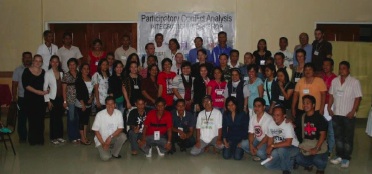Participatory Community Peace and Conflict Assessment - PCPCA - Main Users / Purpose
 |
Non-governmental organisations, local government organisations, community peace workers, development workers, human rights and peace advocates. |
 |
In order to be able to initiate a process for conflict transformation, the importance of local actors is paramount. Peace-building activities need to be conceptualised as a form of engagement involving the entire society. As conflicts take place within societies, it is within the conflicting societies that peace-building measures must be rooted. Strengthening and fostering the potentials of local actors with an active interest in addressing peace building needs to be seen as key principle of civil conflict management. Experience has shown that such activities are of greater impact and more sustainable if the process is led from within the communities with some degree of external support if and where necessary. Photo 1: Participatory Community Peace and Conflict Assessment means involving all stakeholders
|
